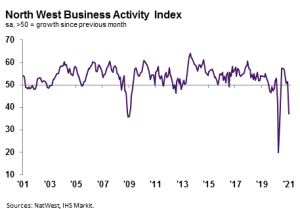NW region’s economic recovery loses momentum as Omicron adds to uncertainty

Growth of business activity in the North West slowed in December, the latest Regional PMI data from NatWest showed, with rising prices, supply-side constraints and renewed uncertainty following the emergence of Omicron, all acting as headwinds to the region’s economic performance.
The headline North West Business Activity Index – a seasonally adjusted index that measures the month-on-month change in the combined output of the region’s manufacturing and service sectors – registered 53.1 in December.
Although still above the 50.0 mark that separates growth from contraction, it was down from 57.6 in November to signal a notable loss of growth momentum as the year drew to a close. The region’s slowdown mirrored the trend recorded for the UK as a whole.
December data signalled a 10th consecutive monthly rise in the level of new business received by firms in the North West, as demand conditions continued to recover following the lockdowns earlier in the pandemic. That said, the rate at which they increased was the weakest in this sequence and slightly below the national average.
Broad stagnation in manufacturing new orders compared with a solid, albeit slower, rise in service sector new business.
On balance, firms in the North West remained confident of seeing a rise in business activity over the next 12 months. However, reflecting heightened concerns over the direction of the pandemic, the degree of optimism slipped to the lowest since December 2020. Expectations in the region were also below the average for the UK as a whole.
Manufacturers in the North West remained more upbeat about the outlook than their service sector counterparts.
The rebound in private sector employment in the North West – observed since last March – continued into the final month of 2021. The rate of job creation eased to a five-month low, but it remained solid overall and notably quicker than the pre-pandemic historical average.
The increase in workforce numbers reflected efforts by local firms to meet rising demand, anecdotal evidence showed.
Continuing the trend seen since last April, firms in the North West reported a rise in outstanding business – ie orders received but not yet completed – in December. However, having slowed for the fifth time in the past six months, from a record high in June, the rate of accumulation was only modest and the weakest in the current sequence. The increase in backlogs was centred on the manufacturing sector, where firms reported the influence of raw material and component shortages.
Input costs faced by firms in the North West continued to surge higher in December. The rate of inflation ticked down from November’s peak but was still the second fastest in the series history, since 1997. Energy, fuel, raw materials, transport, particularly freight, and wages were all sources of cost inflation, according to anecdotal evidence.
Under pressure from sharply rising costs, firms in the North West recorded a further steep increase in average charges for goods and services in December. The rate of output price inflation accelerated slightly to a three month high and was among the quickest on record. Manufacturers, who continued to be hit harder by rising costs, recorded a steeper increase in charges than services firms.

“The flare-up in the pandemic has knocked business confidence, which has, in turn, taken some of the momentum out of the upturn in the labour market, although rising employment remains one of the main bright spots in the survey data.
“There was good news of sorts in the form a dip in the rate of input cost inflation after a long period of intensifying price pressures.
“Still, the price rises seen in December were among the quickest on record, and the Omicron variant brings fresh risks to supply chains and labour markets – and thereby to the inflation outlook – at the beginning of 2022.”




